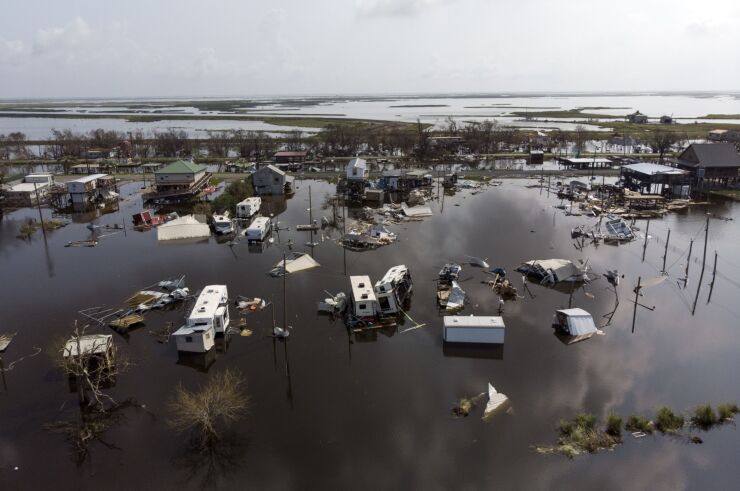As a boy, Hancock Whitney CEO John Hairston fished in the waters off Grand Isle, Louisiana, a well-used launching point for explorations of coastal estuaries.
After Hurricane Ida swept through the small town on Aug. 29, all but a handful of homes and businesses are uninhabitable, Hairston said in a recent interview. “Anything else is roofless or gone,” he noted.

The effort to restore electricity to New Orleans will be measured in weeks. But more rural areas like Grand Isle could take years to recover, said Hairston, who grew up in nearby Mississippi.
For Gulfport, Mississippi-based Hancock Whitney and
Addressing climate change “will take all of our focus and thoughtfulness,” Hairston said. “It’s undeniable that it’s occurring.”
Increasingly, banks from Wall Street to the rural South are facing calls to redirect financing away from fossil fuel companies and toward green energy. Meanwhile, regulators are under pressure to hold financial institutions and other corporations accountable for their role in a warming planet that churns out storms like Ida.
The Securities and Exchange Commission is
Hancock Whitney has so far spent $2.5 million in its response to Ida, footing the bill for everything from meals, bottled water and hotel rooms for displaced staff to roof repairs and supplying power generators to turn the lights back on in New Orleans. The bank has also committed to providing financing that will be needed to rebuild the affected areas.
Such disaster responses are becoming routine for the $35 billion-asset company.
Hairston estimates that he personally grilled 4,000 hamburgers as part of the bank’s effort to provide more than 60,000 meals to displaced people in the wake of four hurricanes that struck its Gulf Coast markets last year.
As Ida was approaching last month, Hancock Whitney executives knew it would be difficult to set up the usual response areas to cook on-site. Hancock Whitney began arranging for catering crews that the bank counts as clients to be ready to move into the hardest-hit areas and provide about 40,000 meals in six days.
About 80 of the company’s own locations were caught in the storm’s path, but 90% of them were back online as of last week. More than 200 employees are still living in hotels.
Hairston acknowledged the coming focus on climate change from bank regulators, and he also spoke about the ways in which the industry has been adapting.
“Fifteen years ago we didn’t talk about needing sustainable power to operate our data center and facilities,” he said. “Now those are topics that are quite common.”
Hancock Whitney has gradually been relying less on loans to the energy industry even as the bank has grown in asset size by 62% over the past six years. Energy loans made up about 1.4% of its entire portfolio at the end of the second quarter, down from 12% in 2015, according to financial disclosures.
As cleaner energy becomes a safer bet, the bank is funding more solar and wind energy projects, Hairston said.
“Every year it seems renewable energy is becoming more profitable on its own, versus being as dependent on government subsidy,” he said.
But even as the toll from climate change mounts, Hairston does not expect any drastic shifts from either the industry or its overseers. "It will be a gradual change,” he said.





